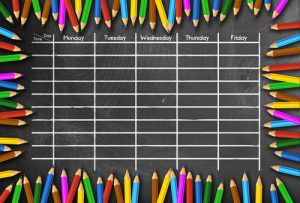5 Steps to Making Sure School Remains a Priority During COVID-19 Closures… Even If Your Kids Seem to Think It’s Just More Spring Break
4/8/2020

Like many of you, I'm an educator. Like some others of you, I'm also a parent. Like all of you, I'm adjusting to this sudden change in how education gets done. Our school days look and feel very different than they did just a few weeks ago, and while some of us are thriving in this new environment, others are not.
For every parent out there, school helped manage day-to-day life. It provided a schedule, food, internet, and social interactions while we worked. It also provided a reason for our kids to get out of bed in the morning.
For every teacher, it ensured personal and continued contact and a way of checking in - you knew how your students were doing and could readily help keep them accountable to their work and life.
Not anymore. And it is our kids and students who are missing out the most.
For many kids, this lack of structure and accountability has been difficult to manage because this is their first time ever being personally responsible to budget not only their schoolwork and classes, but also their free time. They are expected to live like and manage their days like an adult. Which, as any adult can attest to, takes time and practice. Many of our kids and students, however, are learning how to do this on the fly, and they're getting frustrated. So are we, their parents and educators.
Across the globe, we are trying to figure out how to handle what appears to be the new normal, at least for now, in life and schooling. And as schools continue to keep their doors closed and pursue online learning, it has become apparent that what students need most of all is not necessarily a robust and busy curriculum, but the tools and skills to navigate their days and manage their responsibilities. They need to learn how to responsibly manage and live an independent life. And they need us to teach them.
Here are five steps that will help ensure your child will not only thrive during online learning, but also in the years to come.
1. Create a Dedicated Workstation Free from Distractions and Full of Purpose

Wherever and however possible, create a place to work. It doesn't have to be fancy, but it shouldn't be the bed or near a TV (if possible). Our minds and bodies react to habits and places, and when we establish a place where we work, our minds will begin to associate that place as a place for such work, rather than a place for sleeping or gaming. If possible, find a quiet place, make it comfortable, simple, and personal. Be creative. But also, be purposeful.
For many, this can be a desk or kitchen table. For others, it might need to be a closet, a nook in the bedroom, or even a fort in the basement. Whatever the case may be for each family and household, it just needs to be a place that is - if at all possible - quiet and isolated from siblings and other distractions.
2. With a Pile of Work to Get Through, Where Do You Start? … First Period, of Course

It is overwhelming to wake up in the morning and see all the emails and assignments teachers have posted for our kids. "Where do I even begin?" our kids might think as the feeling of angst washes over them. The answer, though, is simple: with the first period of the day.
When your child opens their email for the day, don't . . .
- let them focus on all the unread emails or
- click through them all, one after the other, as a way of "seeing" what is due
Instead, have them . . .
- follow their regular school schedule, not their inbox
- focus on their first period class first. If it is English, only open your English class emails. Nothing more.
- Once the first period is finished, have them move on to their second period of the day. If it is Math, only open Math emails. Then move to third period and so on until they reach your last class of the day.
For many kids, keeping a regular school schedule also means getting to bed and waking up at a decent hour. As much as possible, kids working from home need to hold to their typical school-day schedule. They need to get up early, shower, get dressed, eat breakfast, then "head to school." Not only will a good night's sleep and a normal schedule help them work and think at a high level, it will also allow them time to chat with their teachers in real time, as most educators will still be working their regular school-day schedule. Gaming and chatting with friends on social media sites can wait till after school.
3. Creating a VISIBLE Calendar Makes the "I forgots" a Thing of the Past

Most kids probably have a calendar on their phone or computer. Don't let them use it. Instead, have them use their school planners or create a tangible copy that they (and you) can see and touch (and even smell, if so inclined). Not only will their visible calendar act as a reminder of what is to come, it will also provide them one less opportunity to get distracted by their phone. It can also provide you, the parent, one less argument about what they need to be working on and when is it due.
The best calendar is a weekly calendar. You can easily print them off by googling "printable weekly calendars" or your child can make them on any sheet of paper, cardboard, or whatever else is lying around. Either way, have your child use weekly calendars rather than monthly so they have more space to write in all the due-dates and things worth remembering.
Once the calendar is secured, have them color code their future tasks and responsibilities.
Possible Color Codes:
- Tests/Quizzes in Red
- Assignments in blue
- Non School activities in green
- Other important extras in black
The exact colors don't matter. What does matter is the visual differences between tasks, activities, and the priorities they hold. Creating this calendar will give your child a simple glance at everything they have coming, both school and non, and will help them prioritize what is most important from what can wait another day or so.
4. Few Things are as Encouraging as that Feeling You Get When You Complete a Challenging Task

Sometimes, looking at a pile or list of work is daunting. Especially for younger kids with limited experience with a free schedule. Don't stress, and don't let your child stress either - this is life! And it's a process that cannot be completed in one sitting. But it can be accomplished.
Instead of focusing on all that needs to be done, have your child start off with the easy stuff.
- Get the simple work done first. Not only will this ease them into the class and help them remember the content, it will delete tasks from their to-do list which frees up their mind and time for the bigger, more difficult tasks.
- When working on a bigger project, remind your child to keep this same procedure in mind: start with the easy stuff, check off tasks as they get done, and slowly work towards completion.
Not only will this process keep track of what is completed and what is still due, checking off tasks feels great and gives them encouragement knowing that they are indeed making progress and getting closer to summiting the mountain. Which, hopefully, will only inspire them to want to check off more tasks and continue on, rather than get discouraged and quit.
5. Get Fresh Air

Whenever your child feels frustrated or full of doubt, allow and even encourage them to leave their workstation and get some fresh air. Be it shooting a basketball, going for a walk or jog, riding a bike - whatever - just get them outside and moving; let their mind wander on things other than the learning at hand.
Our brains are crazy and extremely powerful, but they're also a muscle that needs rest. When your child heads outside and breathes in fresh air, not only are they getting some much needed movement to their limbs and energy to their heart, they are also giving their minds a rest so that, when they return, it can complete the unfinished task. Even if it's just 5-15 minutes, encourage your child to get some fresh air. And if it's raining, have them splash in some puddles! All the better.
If you are raising your child in a larger city with strict regulations, opening a window can be just as effective. Whatever you have to do, get your child to check out and take in the fresh air and world outside. Let them rest and be refreshed. Then, help them get back to work.
As you help your child or student create the best working environment possible, it is crucial to remember that we must be able to give ourselves and our students a large amount of grace. We're all learning this together and are bound to make a lot of mistakes. When we do, let's not be too hard on ourselves - or others. Instead, let us continue to do the best we can with what we have, encourage our child or student to keep going, and do our very best to communicate, communicate, communicate. Teachers are often willing and wanting to help and forgive missed deadlines or forgotten assignments, especially during times like this. They just need communication. Which, more than anything, is perhaps the most important life skill any child - or adult - can be learning right now: communicate often, give grace, and do the best you can with what you have.
If we can teach and do these things, not only will our children and students survive the COVID-19 months, they'll thrive. And so will we.
- Five Ways for You and Your School to Thrive in the 2021-22 School Year - August 30, 2021
- We Did the Math on What a Teaching Degree Will Earn You Over the Life of Your Career. Here’s What We Found… - July 14, 2021
- Teaching is Not a Job. It’s a Calling… - January 6, 2021











